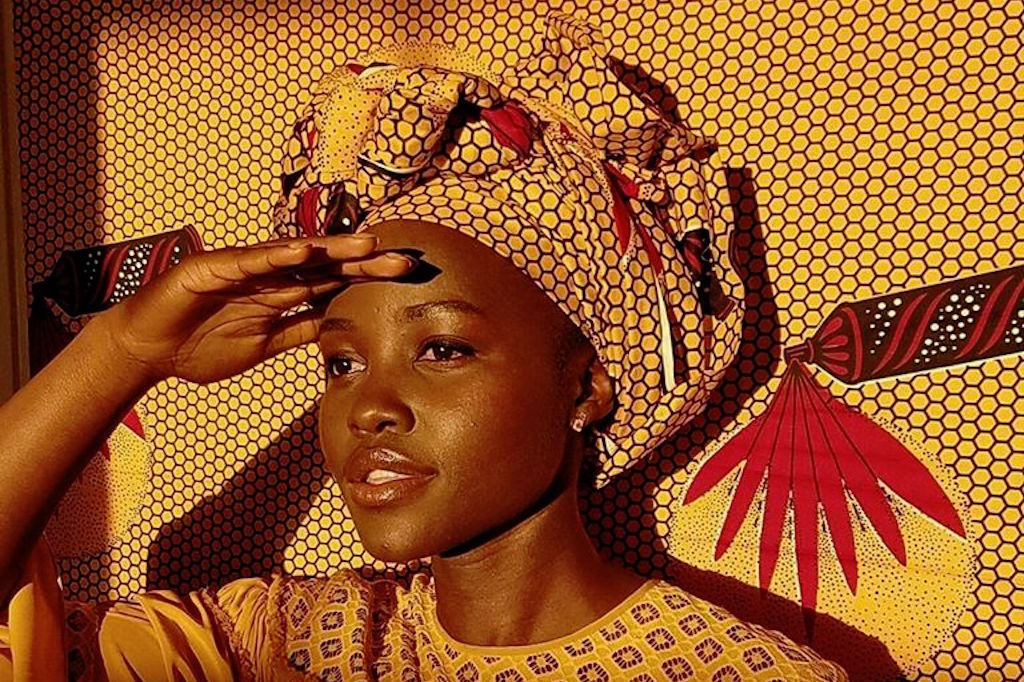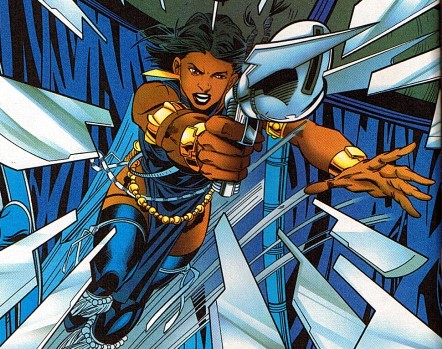“My African-ness Is Not Accidental Or Archivable”: An Interview With Lupita Nyong’o
We talk about women on film, the politics of hair and headwear, and how she's basically taking over Disney.

It seems rather fitting that Disney’s biggest star right now is Lupita Nyong’o. From Star Wars: The Force Awakens and The Jungle Book, to Black Panther and her latest film Queen Of Katwe, there’s no one closer to a modern Disney princess than the 33-year-old Oscar winner. And just like Tiana in The Princess and the Frog, Nyong’o worked her ass off to get to this point.
She’s not only one of the most sought after actresses on the planet, but one who’s also setting out to make a difference. “All too often stories told on the continent have Africans as the backdrop,” she tells me. From that sentence alone, it seems strange to think that she’s talking about one of Disney’s staple inspirational sporting films. (You know, the ones that usually star Kevin Costner as some broken athlete who finds himself through the coaching of white dudes in Texas.)
This one, however, attracted Lupita’s eye for a few reasons. Queen Of Katwe is based on the true story of a young woman from the slums of Uganda who goes on to become a chess prodigy and competes on the world stage. It’s a tale about a woman, starring a woman and — here’s the kicker — directed by a woman (Mira Nair). Those are three big ticks in Lupita’s book.
Women and a More Inclusive Screen World
“It’s powerful to say the least,” Nyong’o says, speaking about the female-led team of Queen of Katwe. “In Mira’s hands, this story is about the little girl prodigy, Phiona Mutesi. In someone’s else’s hands it may have been about her coach (played by David Oyelowo).
“That’s something that I’m very aware of. We see the story from this vantage point because of the person telling the story… [they’re] just as important as the people in the story. When you have different perspectives in places of influence and authority, then you see a more inclusive world being portrayed.”
This is something that Nyong’o believes in deeply, having worked in dozens of different production roles before stepping in front of the camera with her breakout role in 12 Years A Slave (2013). Her relationship with Katwe’s director goes back over a decade to when she first worked as the production assistant on her flick The Namesake back in 2005. Just a few years after that, Nyong’o wrote, directed and produced her own documentary In My Genes (about the treatment of the albino population in Kenya) and started directing music videos for African artists such as Wahu.
It’s this comprehensive knowledge and perspective of the industry that’s got her so far. She plays showbusiness the same way Phiona Mutesi plays chess: like a pro. In many ways, Lupita’s rise from Yale graduate and theatre talent to international movie star and Hollywood darling has followed the traditional narrative: she’s young, she’s beautiful and she’s talented. But she’s also used established elements like the red carpet arena to her advantage, with great fashion doubling as political statement.
“We All Want To See Ourselves”
Nyong’o wore a headwrap during the entire press tour for Queen of Katwe. When Vogue started writing headlines about her bold style, she then used the spotlight to speak about her culture, her heritage and her “African-ness”.
“The headwrap was something that was very reminiscent of my role in the movie (Phiona’s mother),” she tells me. “But it’s also the quintessential African accessory so that was my way of paying homage to the Queen of Katwe,” she says. “What’s really important for me is that the African becomes the global. I’m a product of that continent and I feel very contemporary, so the idea that to be African is to be anything but contemporary is something I do not respect.
“My African-ness is not accidental or archivable.”
It can be tough to be an outspoken feminist trying to get work in the proverbial sausage-fest that is Hollywood, but it’s even harder as a black woman. Lupita is someone who understands the odds against her and sets out to defy them anyway, playing the long game by spinning multiple plates as a filmmaker, a film star and a fashion icon.
Her fans respect her work in all its forms, with millions of them following her every move in front of the camera and away from it — something which she says “humbles” her every day. Now she’s getting ready to cross another threshold as kick-ass comic book heroine Nakia in Marvel/Disney’s Black Panther.

With this role, Nyong’o becomes a bonafide action star with (hopefully) everything from toys right down to t-shirts with her heroine of colour splashed across them. Though otherwise tight-lipped about Black Panther, this is a fact she seems all too aware of when asked about the importance of young people having heroes that look like them on a mainstream level.
“You know,” she says, with a smile. “We all want to see ourselves.”
–
Feature image via Lupita Nyong’o/Facebook.
–
Maria Lewis is a journalist on The Feed SBS and author of the Who’s Afraid? novel series available worldwide. She’s also the co-host and producer of the Eff Yeah Film & Feminism podcast.